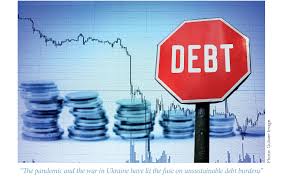ISLAMABAD, Oct 21 (INP-WealthPK): Political instability, global recession fears, soaring inflation and the recent devastating flooding have meted a blow to Pakistan’s equity market, which does not seem to recover from the slump in the ongoing financial year.
WealthPK arranged an interview with Fair Edge Securities Private Limited’s Chief Executive Officer Muhammad Safdar Kazi and quizzed him on his thoughts on the current state of the stock market, its outlook, and some important economic indicators. We also talked about his strategic intentions as well as the factors preventing Pakistan’s stock market from reaching its full potential.
The primary operations of Fair Edge Securities Private Limited include consultancy, portfolio management, share brokerage, and investment counselling. The company was established on March 8, 2002, under the Companies Ordinance, 1984.
WealthPK: Let’s begin by reviewing Pakistan’s current economic situation. Do you believe things will improve anytime soon?
Muhammad Safdar Kazi: The country’s economy has gotten worse due to political instability, global recession fears, and back-to-back catastrophes, first Covid-19 and then flooding. Pakistan Stock Exchange has suffered huge losses during this time. In 2017, the PSX index reached 53,000, making it one of South Asia’s top-performing equity markets at the time. However, back-to-back crises have shattered investor confidence, plunging the stock market below 28,000 points in 2019.
These past nine months have been difficult for Pakistan’s economy due to a rise in global commodity prices and political upheaval. Amid the current volatile situation, it is anticipated that the 5.6% growth rate attained in FY22 will decline between 3% and 2% in FY23.
WealthPK: How have the disastrous floods and Russia-Ukraine conflict affected Pakistan’s financial system?
Muhammad Safdar Kazi: Though the Russia-Ukraine conflict has not directly affected Pakistan’s financial system, the country’s current account has gotten worse as a result of rise in international energy prices.
On the other hand, Pakistan’s already soaring inflation would further increase significantly as a result of loss of crops and livestock to floods. We will have to import food items on a net basis, which will require a lot of foreign exchange, putting pressure on our balance of payments. Our exports are likely to decline in the ongoing fiscal and local consumption increase, meaning importing more.
WealthPK: How do you foresee the corporate sector’s outlook, and which stocks are going to be more appealing to investors?
Muhammad Safdar Kazi: The market has responded favourably to the new finance minister’s appointment as they rose by 1,000 points, and the rupee strengthened against the dollar.
It wouldn’t be prudent for me to recommend any particular stocks, but there are at least 20 that are trading less than 50% of their book value, and some are even lower. Forget about replacement value because the dollar is much higher. However, the steel and cement sectors look positive because of the anticipated increase in post-flood reconstruction activity.
WealthPK: Of late, the rupee is strengthening against the dollar, and the finance minister predicts it will appreciate more. Do you think it is possible to push the exchange rate below Rs200 or even lower?
Muhammad Safdar Kazi: I strongly believe that speculation, political turmoil, and a decline in investor confidence led to the undervaluation of the rupee. There is a powerful lobby that profits overnight from exchange rate fluctuations.
There is speculation on the market that Mr Dar tends to control exchange rate. I believe the rate will probably be fixed at a specific level, which will cause panic among hoarders, forcing them to panic selling, leading to rise in the value of the rupee.
I also believe the rupee value is actually worth between Rs200 and Rs205 to a dollar.
WealthPK: What are the main issues facing Pakistan’s economy? And what are potential solutions?
Muhammad Safdar Kazi: Apart from political uncertainty, volatile external sector is another major cause for concern. In FY22, Pakistan’s imports stood at whopping $84 billion against exports of just $31 billion, further exacerbating the balance of payment woes. We hoped an IMF loan programme would stabilise the balance of payments issue, but not to a great extent. Pakistan must expand its export base in order to generate revenues.
Pakistan’s budget deficit, the difference between the expenditures and revenues, is another area of concern as a major chunk of our revenues is spent on debt servicing.
Though the Federal Board of Revenue has adopted an effective revenue generation strategy, there is still much work to be done to increase Pakistan’s sources of income. Furthermore, there is not even the slightest effort made, and there is no system in place, to wholly document the economy.

























